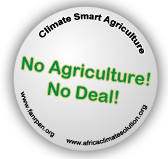 ACCID RSS newsfeed ACCID RSS newsfeed
Over 500 Agriculture Experts Convene at Day-Long Event Held in Parallel with United Nations Climate Talks
03 December 2012, Agriculture, Landscapes and Livelihoods Day 5
URL: http://www.agricultureday.org/blogs/2012/12/03/over-500-agriculture-experts-convene-at-day-long-event-held-in-parallel-with-united-nations-climate-talks/
Over 500 Agriculture Experts Convene at Day-Long Event Held in Parallel with United Nations Climate Talks
Renewed Call to Action Issued for Negotiators to Include Agriculture in Addressing Global Climate Change Challenges
Doha, Qatar: Global agricultural leaders and practitioners come together today to share best practices and build consensus on policy recommendations from the sector at Agriculture, Landscapes and Livelihoods Day, held in parallel with the United Nations Framework Convention on Climate Change (UNFCCC) currently underway.
Our global food supply and the livelihoods of millions of farmers depend on a sustainable agriculture system, yet climate change is gravely threatening both. Specific actions on how agriculture can adapt to climate change remains absent from the UNFCCC discussions. Furthermore, it is reported that as much as 6 billion tons of CO2 could be saved annually by 2030 through improved agricultural techniques.
Agriculture, Landscapes and Livelihoods Day
seeks to identify scalable solutions, gaps and trade-offs in addressing climate change impacts for agriculture, the environment and farmers. The one-day event features a high level panel session and a series a roundtable discussions that focus on various climate change adaptation and mitigation strategies that could safeguard global food security as well as reducing greenhouse gas emissions within the agricultural sector.
Dr. Bruce Campbell, Director of the CGIAR Research Program on Climate Change, Agriculture and Food Security CCAFS), comments:
"We are heading for a four degree warmer world, yet are still without any major measures put in place by the UNFCCC to deal with adaptation in agriculture. Agriculture, Landscapes and Livelihoods Day is about convening the people best equipped to get action going on the ground immediately to protect our environment and food supply."
Nineteen organisations involved with the event also issued a call-to-action for negotiators to further consider a Work Program on Agriculture, the adoption of which would advance scientific and technical understanding and inform decision-making on agriculture’s role in addressing future food security and climate change challenges.
Dyborn Chibonga, Chief Executive Officer of the National Smallholder Farmers Association of Malawi (NASFAM) and Farming First spokesperson comments:
"According to experts, yields in food-insecure continents such as Africa and South Asia could decrease by 15 percent and 18 percent respectively, due to climate change. Solutions already exist for countries such as my own that rely on rain-fed agriculture for their food, but they must be supported by a United Nations framework in order to be scaled up and brought to those most in need."
The theme of this year’s event is "Solutions for People in Drylands and Beyond" and will highlight strategies that will improve agricultural productivity in dry regions, which are most vulnerable to climate change.
In the sidelines of the event, a new report, entitled Strategies for Combating Climate Change in Drylands Agriculture, was launched, offering a number of "climate smart" solutions for smallholder farmers in dry regions to reduce their vulnerability and increase their productivity. Countries such as Jordan and Morocco have seen increases in wheat yields of 20 percent and 17 percent respectively, due to some of the improved agriculture practices referenced in the report.
Dr Mahmoud Solh, Director General of the Interntional Centre of International Agricultural Research in the Dry Areas (ICARDA) comments:
"One third of the world’s population lives in drylands, where access to water is becoming even scarcer due to climate change. Many of the answers to the problems faced by people in drylands regions exist, but they cannot succeed without adequate policies that ensure that the most effective innovations are put into action and that long-term funding and investment is available."
Today’s event also marks the first occasion that Agriculture, Landscapes and Livelihoods Day broadens its agenda, shifting discussions towards a combined consideration of agriculture, forestry and land use, and their impacts on society. It is held in conjunction with Forest Day 6, under the theme of "Living Landscapes", exploring the interconnections between the two sectors and how a unified approach could hold sustainable solutions to climate change adaptation and mitigation.
ENDS
Follow the discussions via the event’s social media channels:
Live webcast and blog:
http://www.agricultureday.org/
MEDIA INFORMATION
About Agriculture, Landscapes and Livelihoods Day 5
Since 2009, Agriculture Day has served to raise awareness of the role of agriculture and give greater visibility to the discussions on agriculture in UNFCCC each year at the annual UN climate talks. By providing a unifying platform for stakeholders across the agriculture value chain, Agriculture Day has been able to take forward a strong message to negotiators in favour of a dedicated work programme. A fourth Agriculture Day, held alongside the United Nations Sustainable Development Conference (Rio+20) in June 2012 also helped reaffirm the centrality of agriculture and climate change to development.
http://www.agricultureday.org/
About New Report, Strategies for Combating Climate Change in Drylands Agriculture
This report, authored by a group of leading international experts in climate change and agriculture, finds that that rural communities in the world’s dry areas are the hardest hit by today’s changing climate patterns. It argues that many of the solutions are available now but increased investment and urgent action are needed to bring food security to these regions – including water and land management practices, improved crop varieties and strategies for diversifying traditional crops.
About "The Story of Agriculture and Climate Change" Infographic & Call-to-Action:
"The Story of Agriculture and Climate Change: The Road We’ve Traveled" infographic maps the history of the United Nations Framework Convention on Climate Change (UNFCCC) and the progress of the agricultural sector in addressing these climate change challenges throughout the negotiations. It includes a call-to-action for UNFCCC negotiators to further consider a Work Programme on Agriculture under the Subsidiary Body for Scientific and Technical Advice (SBSTA).
http://www.farmingfirst.org/climate
|

